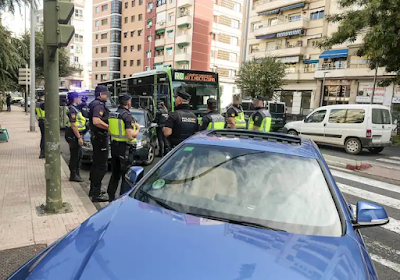In this week's Camino a Ítaca a look back at the summit of Culture Ministers from the EU that was held here in Caceres this week. Click over to read the original version published in Spanish in El HOY or read the English version below. (PDF en castellano abajo)
The scene in the square
looked like some sort of Mad Max inspired gladiator theme in the gauzy early
morning light. The sun had yet to come up over the Bujaco Tower and was just
turning the crenellations of the Yerba and Hornos Towers a warm ochre.
There, at opposite ends of
the square, two riot vehicles from the National Police were facing off against
each other across the barren quadrangle. Like some sort of dystopian jousting
match, they sat immobile, ready to pounce at any time.
This wasn’t your everyday
morning.
As we climbed the Gran
Via, more blue vans rolled somewhat menacingly down the hill and into the
square, looking like a procession right out of the authoritarian Handmaid’s
Tale. In San Juan we came across a different kind of control. Two canine police
dog contingents were parked next to the church and were getting ready to
patrol.
Further up the street in
Canovas we came across uniformed officers standing on street corners, some
armed with heavy looking machine guns.
“Don’t stare at them like
that!” warned my 10-year-old daughter as I was visibly taken aback by how
heavily armed they were. “If you look at them too long, they’ll think that you
want to rob a bank or something.”
But I wasn’t necessarily
afraid. I had had enough experience with Spanish police to know that they are
some of the most professional and relatively soft-handed police forces in the
world, especially when compared with the brutal and barbaric policing in my
native North America. Their overwhelming presence, however, on our daily walk
to school was definitely domineering and even imperious.
And just as she finished
her warning a police helicopter buzzed overhead as it repeatedly circled the
city all day while seven more riot vehicles pulled around the Fuente luminosa.
Caceres was definitely
under siege. The irony was why.
The culture ministers from
all the countries in the EU were in town to talk about culture and here we were
almost locked down. They had come to discuss the benefits that culture can
bring about in society under a net of suspicion and protection so severe that
it seemed like something out of Margret Atwood’s terrifying tale.
They had come to sign what
will be known as the Caceres declaration. A document stating that the EU is
committed to working to make culture a crucial element of policies in favor of
peaceful, just and egalitarian societies. Because, they claim, culture plays an
essential role in the construction of democratic societies and in the personal
development of citizens and is a cornerstone of the European project.
But what kind of
declaration will they be signing along with far-right governments from countries
like Poland, Italy, Hungary, Sweden and Finland? Governments who are
comfortable banning works of art that they don’t agree with and that are two
steps away from holding public book burnings. Will Maria Guardiola find common
cause with them and find support for her PP and its extreme right cohorts censoring
works of art?
But then I look around at
all the police presence and think, maybe they did this to make them feel at
home?







